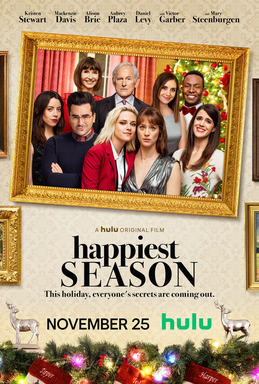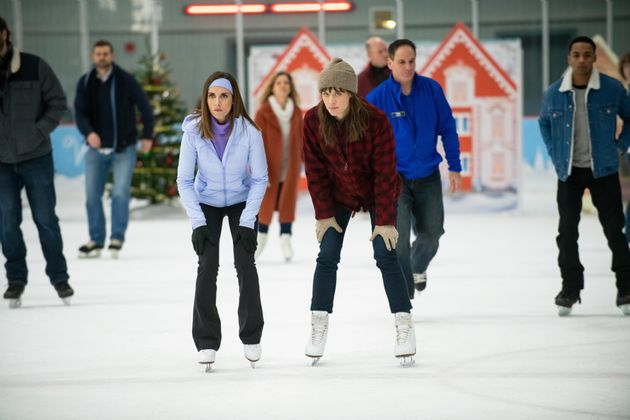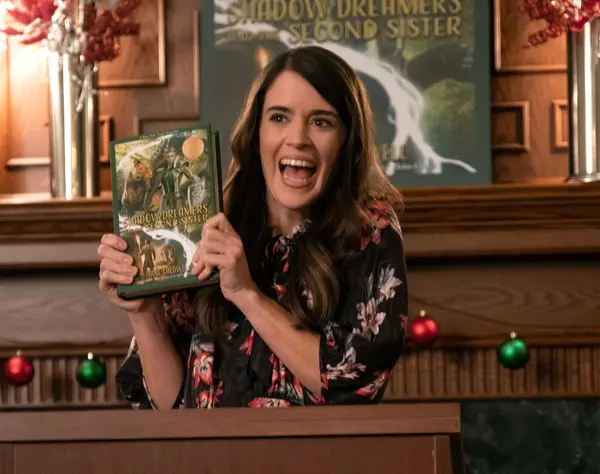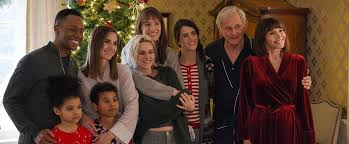By Kaya Miller
A Hulu original movie that premiered on November 25th starring Kristen Stewart and Mackenzie Davis, has emerged as one the first of its kind. It was a Christmas movie that centered around a same-sex (specifically lesbian) relationship.
Written by Clea DuVall and Mary Holland, this movie’s main characters, Harper (Mackenzie Davis), and Abby (Kristen Stewart), are dating, and decide to visit Harper’s parents for the holidays. The couple’s plans are all going well until Abby finds out during the drive to see Harper’s folks that she hasn’t told her parents about her sexuality, nor about their relationship. The pair then have to cope with Harper’s difficult family, while simultaneously hiding their romantic secret.
This romantic comedy might be the first to showcase a lesbian relationship in the special holiday movie format. Traditionally, “feel good” movies made for the holidays will center around a heterosexual relationship whose challenges are not as real (nor, let’s be honest, as difficult) as those facing the couple in Happiest Season. If you look up Hallmark movies, what do the promotional posters display? Usually, you see pictures of a straight couple whose attempt at romance is the subject and theme of the movie.
Even now, with a new same-sex film coming to Hallmark called “The Christmas House,” if you search the most recent Hallmark movies on Google, the top results don’t list any that feature gay protagonists. Keeping this in mind, it becomes apparent how desperately the holiday rom-com genre needs Happiest Season.
The basic plot is one we’ve seen used many times before in “traditional” rom-coms. A significant other is brought to meet their mate’s wacky family, and struggles to fit in during their stay. However, with Happiest Season featuring a same sex relationship, it brings a certain freshness to its genre. Unlike stereotypical romantic-comedy films, Happiest Season tries to elevate the genre’s staples, such as the mandatory “happy ending,” and the quirky supporting characters who drive the story. And while the film was generally well-received, it’s ironic that it didn’t try to hide it’s shamefully unoriginal tropes as hard as the movie’s main character tries to hide who she really is.
Yet the movie does a great job of taking its cliches in stride as it adheres to the required elements of a rom-com as well as to the typical characteristics of a Christmas movie: a redemption arc, having Harper find her way back into Abby’s good graces, the neglectful family that is required for the plot to work, and one of the protagonists not liking Christmas. You see, the film reveals very quickly during its first bits of dialogue that Abby does not like Christmas, And this trope requires that her love interest, Harper, must change Abby’s mind—which with the combined challenges of being closeted and having such a high maintenance family, becomes quite fun to watch. What this plot device lacks in originality, it makes up for in its unorthodox execution and surprising humor.
The script fulfills what we’ve come to expect from typical rom-coms, but works in some new jokes and narrative styles that evoke the feeling of freshness I mentioned earlier. If you take a look at the made-for-tv films produced by Hallmark, ABC, (or really, any name-brand studio), attempts at comedy are there, but frequently fall flat upon repeated viewing. I personally have rewatched this film in its entirety twice since it premiered, and its jokes remained solidly funny each time I heard them. Plus, as with many other movies worth watching, if you watch them again you may discover something new and surprising.
However, with many formulaic studio features, if you try to rewatch the same movie with its recycled plot structures and gags, the feelings of enjoyment are not repeated. Recently, I found myself viewing one of these major productions for the second time, and I discovered it lacked the charm I remembered. With Happiest Season, though my memories could be skewed due to the shorter period between my viewings, I found it met my expectations every time. As not to spoil the fun, if you do find yourself watching it, look out for “Jane” as she consistently makes you laugh, being one of the many kooky side-characters.
What Happiest Season also does, outside of breaking some of the narrative constraints favored by these kinds of movies, is show what a relationship under such strain can be like while making you laugh along the way. Whenever entertainment media introduces a queer couple with one person who is not already out to whomever, it can feel dragged out as a predictible cliche, or just be really tiresome to see. And yes, some people even found this to be true in Happiest Season. The movie does at times feel redundant in its message, but it also rises to the challenge of remaining relevant thanks to an important speech given by Dan Levy’s character, John,towards the end, about being a closeted couple. It explains the toil of coming out and that you have to know what you need in a relationship. This scene—in my opinion—really emphasizes that none of the coming-out process is easy for anyone, but you can’t hate someone for their individual process and needs.
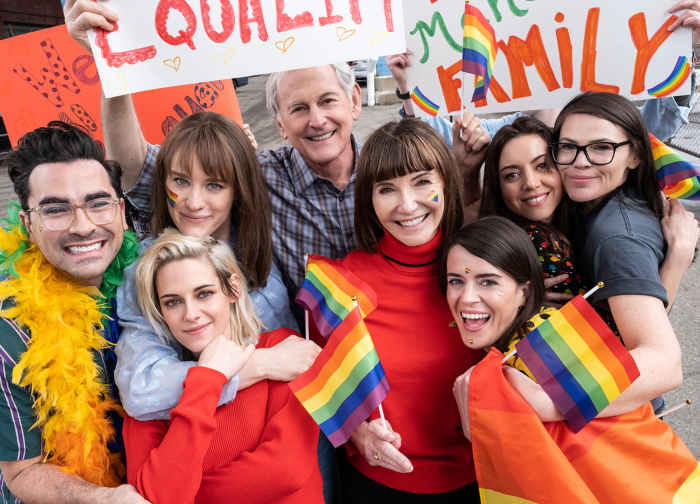
Has this storyline received negative feedback from those in the LGBTQ community? Absolutely. They villainize Harper, call her “toxic” or say that their relationship was abusive—and one can see that perspective being valid. Throughout the movie, Harper will withhold something from Abby, or lash out in a hurtful way. Others will defend her, using John’s speech as a prime reason to not sling words with such harsh connotations around. I find that all of this, even the different perspectives on Harper and Abby, adds to the value of Happiest Season as a whole. It adds value by sparking controversial conversations like the “Is Harper toxic?” discussion mentioned above, or the particularly hot topic (discussed by the Aubrey Plaza, the actress who plays Riley), of whether or not Riley and Abby should be together instead.
In short, plots that dare to raise thought-provoking ideas are exactly what formulaic Hollywood films need … and not just romantic-comedies, but holiday-themed movies too. One thing that people still fight about, quite funnily in fact, on Twitter and other social platforms, is Aubrey Plaza’s suggestion of starting an organized protest against her character, Riley, not ending up with Abby.
In conclusion, although Happiest Season contains certain flaws and active cliches, it’s a movie I highly recommend. It portrays a lesbian relationship weathering a crisis, all while sustaining a fun tone. It sparks important conversations that can promote insight among members of the LGBTQIA+ community when discussing the topic of coming out, plus, it has a phenomenal cast including Kristen Stewart, Mackenzie Davis, Mary Holland, Aubrey Plaza, Dan Levy, Mary Steenburgen, and lots more lovable people. You can watch it on Hulu this holiday break, or whenever you like, because again, it is truly worth your time.
Trailer:
https://www.youtube.com/watch?v=h58HkQV1gH
